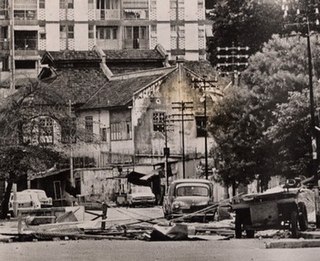
The economy of Malaysia is the sixth largest in Southeast Asia and the 36th largest in the world in terms of nominal GDP. When measured by purchasing power parity, its GDP climbs to the 30th largest. Malaysia is forecasted to have a nominal GDP nearly half a trillion US$ by the end of 2024. The labour productivity of Malaysian workers is the third highest in ASEAN and significantly higher than Indonesia, Vietnam and The Philippines. The 2024 Global Competitiveness Report ranked Malaysian economy the 34th most competitive country economy in the world.
Bumiputera or bumiputra is a term used in Malaysia to describe Malays, the Orang Asli of Peninsular Malaysia, and various indigenous peoples of East Malaysia. The term is sometimes controversial. It is used similarly in the Malay world, Indonesia, and Brunei.

The 13 May incident was an episode of Sino-Malay sectarian violence that took place in Kuala Lumpur, the capital of Malaysia, on 13 May 1969. The riot occurred in the aftermath of the 1969 Malaysian general election when opposition parties such as the Democratic Action Party and Gerakan made gains at the expense of the ruling coalition, the Alliance Party.
The New Economic Policy (NEP) was a social re-engineering and affirmative action program formulated by the National Operations Council (NOC) in the aftermath of the 13 May Incident in Malaysia. This policy was adopted in 1971 for a period of 20 years and it was succeeded by the National Development Policy (NDP) in 1991.

Tun Dr. Che Abdul Daim bin Zainuddin is a Malaysian politician and businessman who served as the Minister of Finance from 1984 to 1991. In May 2023, he was investigated for corruption of RM2.3 billion by the Malaysian authorities related to the expose from the Pandora Papers. which led to some bank accounts and assets controlled by him or his family to be seized or frozen.

Khazanah Nasional Berhad (lit. 'National Treasure Limited'; doing business as Khazanah Nasional or simply Khazanah) is the sovereign wealth fund of the Government of Malaysia. One of the largest sovereign wealth funds in the world, it was established to invest surplus revenues for Malaysia. Through its investments and activities, the fund seeks to deliver sustainable economic and societal benefit for the nation. This includes achieving long-term risk-adjusted returns across the portfolio, as well as undertaking investments that catalyse new growth areas, strengthen Malaysia’s economic competitiveness, and contribute to priority socioeconomic outcomes.
Article 153 of the Constitution of Malaysia grants the Yang di-Pertuan Agong responsibility for "safeguard[ing] the special position of the 'Malays'(see note) and natives of any of the States of Sabah and Sarawak and the legitimate interests of other communities" and goes on to specify ways to do this, such as establishing quotas for entry into the civil service, public scholarships and public education.

Ketuanan Melayu is a political concept that emphasises Malay preeminence in present-day Malaysia. The Malays of Malaysia have claimed a special position and special rights owing to their longer history in the area and the fact that the present Malaysian state itself evolved from a Malay polity. The oldest political institution in Malaysia is the system of Malay rulers of the nine Malay states. The British colonial authorities transformed the system and turned it first into a system of indirect rule, then in 1948, using this culturally based institution, they incorporated the Malay monarchy into the blueprints for the independent Federation of Malaya.
The social contract in Malaysia is a political construct first brought up in the 1980s, allegedly to justify the continuation of the discriminatory preferential policies for the majority Bumiputera at the expense of the non-Bumiputera, particularly the Chinese and Indian citizens of the country. Generally describing the envisaged 20-year initial duration of the Malaysian New Economic Policy, proponents of the construct allege that it reflects an "understanding" arrived at – prior to Malaya's independence in 1957 – by the country's "founding fathers", which is an ill-defined term generally taken to encompass Tunku Abdul Rahman, Malaysia's first Prime Minister, as well as V. T. Sambanthan and Tan Cheng Lock, who were the key leaders of political parties representing the Malay, Indian and Chinese populations respectively in pre-independence Malaya.
The First Malaysia Plan (1966–1970) was an economic development plan implemented by the government of Malaysia. It was the first economic plan for the whole of Malaysia—Sabah and Sarawak included—as opposed to just Malaya, which previous economic plans had confined themselves to. The plan's objectives were to promote the welfare of all citizens, and improve the living conditions in rural areas, particularly among low-income groups.

The Second Malaysia Plan was an economic development plan introduced by the government of Malaysia with the goal of implementing the Malaysian New Economic Policy (NEP). It lasted from 1971 to 1975 and aimed to "restructure" the society of Malaysia and reduce Malaysian Chinese and foreign dominance in the economy of Malaysia so as to improve the economic position of the Malays. It was the successor to the First Malaysia Plan, which was also intended to specifically tackle the problem of poverty among the Malays. However, the First Malaysia Plan had limited success, which may have been a factor in the 13 May Incident in 1969 when race riots broke out in Kuala Lumpur. The Second Malaysia Plan had been regarded as excessive in its zeal to increase Malay participation in the economy, and the government accordingly scaled back the emphasis on restructuring the economy when the plan ended.
In Malaysian politics, the Malay Agenda is a concept related to the ideal of ketuanan Melayu. Although it did not feature in public discussion for much of the 20th century, in the early 2000s, it came to prominence due to its usage in the discourse of several politicians from the United Malays National Organisation (UMNO), the leading political party in Malaysia. The Malay Agenda is closely related to the UMNO, which sees itself as the guardian of the Malay ethnic group in Malaysia.
Poverty in Malaysia is a controversial economic issue. The definition of poverty and the poverty line for Malaysians has been disputed, and government policies to address poverty such as the Malaysian New Economic Policy have been met with political protest.

The 1969 race riots of Singapore were one of the two riots encountered in post-independence Singapore. The seven days of communal riots from 31 May to 6 June 1969.

The 2007 HINDRAF rally was a rally held in Kuala Lumpur, Malaysia, on 25 November 2007. The rally organiser, the Hindu Rights Action Force (HINDRAF), had called the protest over alleged discriminatory policies which favour ethnic Malays. The rally was the second such street protest after the 2007 Bersih rally in Kuala Lumpur on 10 November 2007. The rally started when a crowd estimated to be between 5,000 and 30,000 people gathered outside the Petronas Twin Towers at midnight, early Sunday morning.
The New Economic Model (NEM) 2011-2020 was an economic plan in Malaysia unveiled on 30 March 2010 by Malaysian Prime Minister Najib Razak which was intended to more than double the per capita income in Malaysia by 2020. The programme aimed to shift affirmative action from being ethnically based to being need-based hence becoming more competitive, market and investor-friendly.
The economic policy of the Najib Razak government marked a shift away from the state-oriented economic programmes of previous Malaysian governments. Najib Razak's government introduced various policies to liberalise the economy during his premiership from 2009 to 2018. This included a New Economic Model, subsidy reforms, international free trade agreements and stimulus packages. However, in the later stages of his administration, Malaysia experienced an economic downturn and a depreciation of the Malaysian Ringgit due to the 1Malaysia Development Berhad scandal (1MDB).

Malaysian Indians or Indo-Malaysians are Malaysian citizens of Indian or South Asian ancestry. They now form the fourth-largest group in Malaysia, after the Malays, Chinese, and the indigenous groups of Malaysia. Most are descendants of those who migrated from India to British Malaya from the mid-19th to the mid-20th centuries. Most Malaysian Indians are ethnic Tamils; smaller groups include the Malayalees, Telugus and Punjabis. Malaysian Indians form the fifth-largest community of Overseas Indians in the world. In Malaysia, they represent the third-largest group, constituting 7% of the Malaysian population, after the ethnic Malays and the Chinese. They are usually referred to simply as "Indians" in English, Orang India in Malay, "Yin du ren" in Chinese.

Since its formation in 1963, Malaysia's economic performance has been one of Asia's best. Real gross domestic product (GDP) grew by an average of 6.5% per year from 1957 to 2005. Performance peaked in the early 1980s through the mid-1990s, as the economy experienced sustained rapid growth averaging almost 8% annually. Malaysia's economy was greatly impacted by the 1997 Asian financial crisis, but recovered.
Shared Prosperity Vision 2030, is a government blueprint released in 2020 by the Government of Malaysia for the period of 2021 to 2030 to increase the incomes of all ethnic groups, particularly the Bumiputera comprising the B40, the hardcore poor, the economically poor, those in economic transition, Orang Asli, Sabah and Sarawak bumiputeras, the disabled, youths, women, children and senior citizens.










